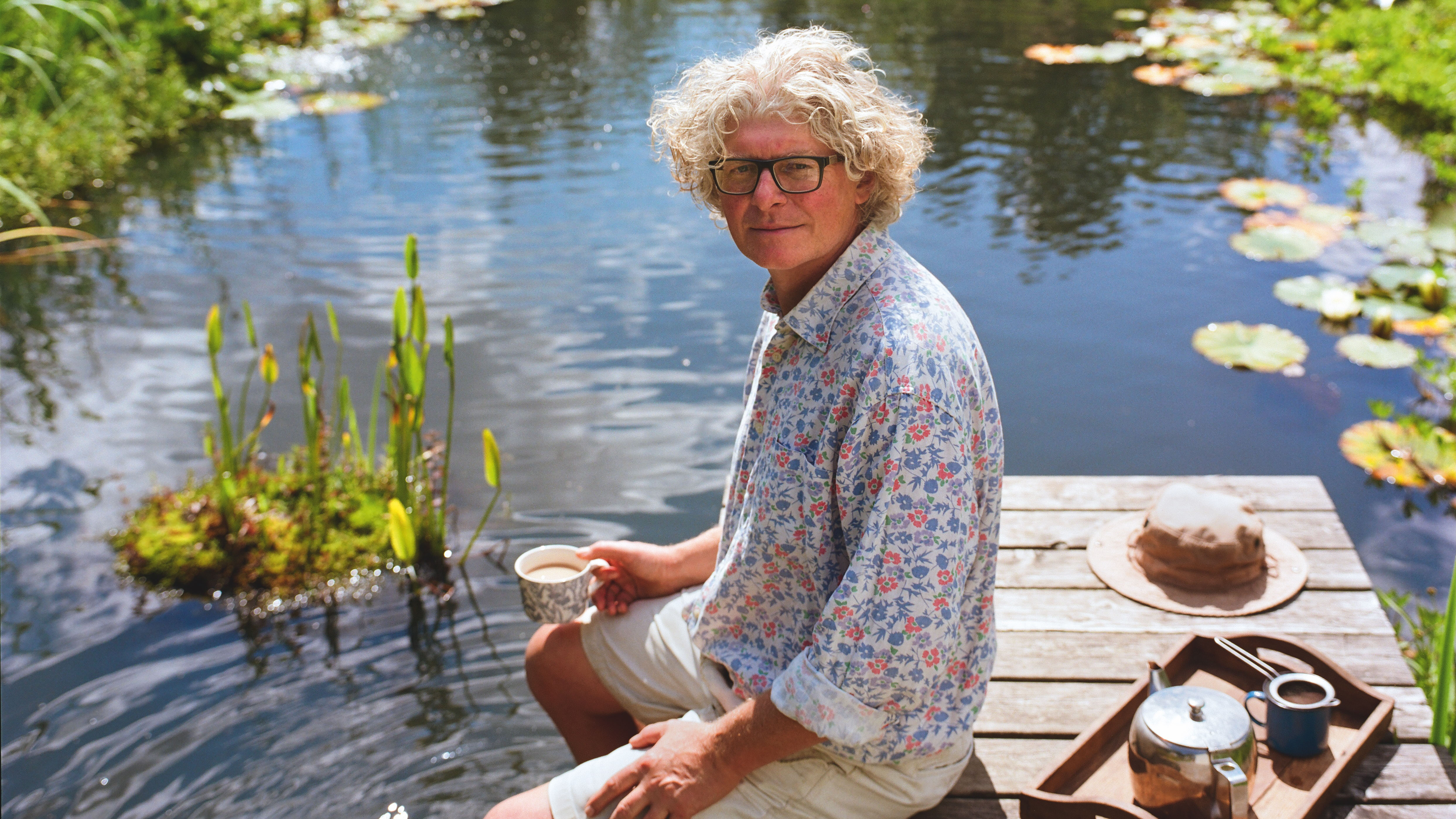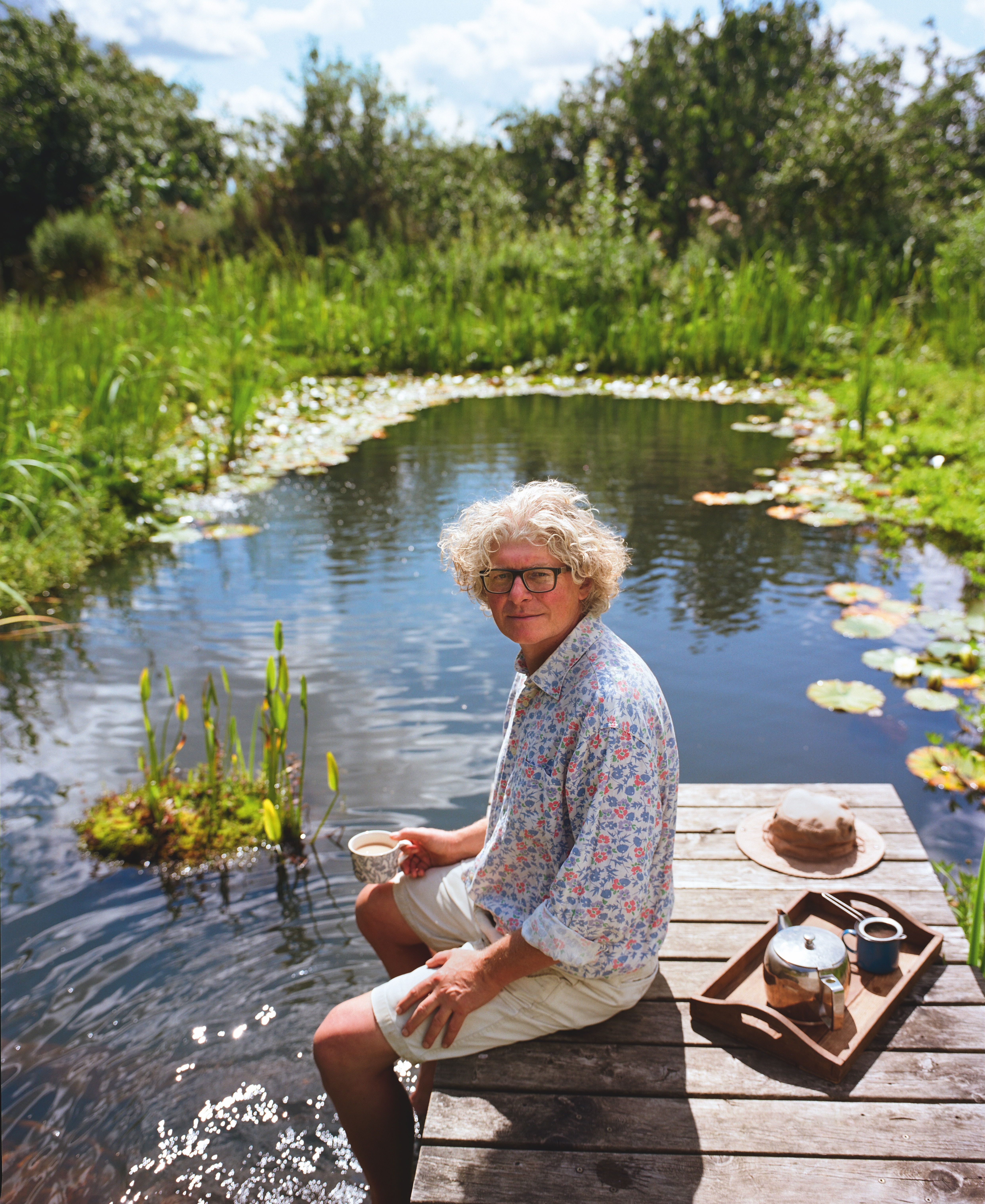'Each one is like a coral reef in an agricultural desert': One man's mission to rewild the swimming pool
At a fraction of the cost of a traditional pool, David Pagan Butler’s pioneering organic alternative has a global fanbase and he’s on a mission to share his knowledge.


Exquisite houses, the beauty of Nature, and how to get the most from your life, straight to your inbox.
You are now subscribed
Your newsletter sign-up was successful
As the group gathers for coffee on a shady terrace at David Pagan Butler’s smallholding deep in the north Norfolk countryside on one of his popular one-day pool courses, he recounts how an early effort was almost scuppered by his son Theo putting sticklebacks in the pond. ‘Fish will wreck it,’ he explains, ‘because they eat all the Daphnia —water fleas that you need to eat the algae.’ (His USP is the crystal-clear water of his pools; of which, more later).
To deal with the sticklebacks, Theo fished a pike out of the river and released it into the pool, ‘which gave a certain edge to swimming’. David made one of his idiosyncratic videos about it for his YouTube channel (120,000 subscribers) ‘and someone shopped me to the Environment Agency’. The officer who duly visited was ‘supportive, but strict’; the pike was not to be returned to the river. It lived for many years in the pool and would cause much excitement appearing from the depths during pool courses.

Testing the water: David Pagan Butler learnt on the job with his first organic pool at home in Norfolk.
This proves an excellent ice-breaker and gets us chatting about plans for our own pools. People have come from all over the country for this course — one man has flown in from Italy. We’re all keen for somewhere to swim that is beneficial for wildlife; there’s even a triathlete who wants an environmentally friendly pool to train in.
We have an old grass tennis court in our garden in a village close to David's, which has proved far too much effort to maintain. It’s variously used as a football pitch or a manège, depending on which of our children has commandeered it, and I’ve been hankering to install one of David's organic pools. It’s relatively low cost: he estimates in the region of £15,000–£25,000, depending on how ‘friendly’ your builders are and how much work you can do yourself (for a traditional pool, budget in excess of £100,000).
More importantly, his pools are things of bucolic beauty. ‘It is the single most effective thing you can do for biodiversity in your garden,’ advocates Dominic West, a friend of David, who helped the film star create a pool in his Wiltshire garden (see box). Other high-profile clients include Julie Montagu, the Countess of Sandwich and Daniel Craig’s stuntman and director, Adam Kirley.
'The water is perfectly at home in the landscape, the larch wood jetty inviting us to dive straight in'
As we follow David down through the garden on the first really hot day of June, the pool appears, ringed with waterlilies, irises, rushes and marsh marigolds. Dragon-flies skim the surface and the kingfisher has been known to visit. Newts, toads and frogs are all encouraged. ‘They’re in crisis,’ he laments. The water is perfectly at home in the landscape, the larch wood jetty inviting us to dive straight in. However, there is work to be done and notes to be taken as he talks us through his pioneering method.
David is an engaging host — after studying engineering (‘the electrical kind, not the fun stuff like this’), he became a film-maker for the BBC. His childhood obsession with ponds and building one big enough to swim in took on a new urgency on discovering in 2008 that the eldest of his four sons, Jasper, then only six, had an allergy to chlorine. It was then that he began to create the natural swimming pool in front of us for his family.
Exquisite houses, the beauty of Nature, and how to get the most from your life, straight to your inbox.
He is somewhat apologetic, pointing out that in building this, his first pool, he has ‘learnt from my mistakes’. The water looks inviting enough to me, but he stresses that the water in the pools he’s made since is ‘crystal clear’. This is largely due to his own technology of bubble-powered pumps (instead of a conventional pool pump linked to the mains) to drive water circulation. This means there’s no need for electricity nearby, only a compressor, which can sit about 55 yards away. In a pool such as David's — 6½ft deep and 39ft long — he says he’d now install six bubble pumps (this only has three). The standard design is ‘a rectangle defined by a concrete block wall within a saucer-shaped wetland area’, into which goes a fleece layer and then the lining material.
After a delicious light lunch of homemade nettle soup, freshly baked bread, sausage rolls, cheese and fruit — produced by David’s partner, Alison — we head back to the ‘classroom’ under a large awning. The key, he reiterates, is to keep nutrient levels in the pool low in order to keep algae out. Otherwise, the water will be opaque, rather than clear. It’s a firm ‘no’ to cheeky children intent on introducing fish — and ducks must also be kept out. I tell him that our children were looking forward to swimming with their beloved runner ducks they raised themselves, but it’s no good. ‘Their poo makes it horrible and you can also get something called swimmer’s itch, or cercarial dermatitis — a rash caused by a parasitic flatworm that infects birds,’ he cautions.
Mains water, we learn, isn’t ideal for the pool, as it’s high in nutrients and the pool will go ‘pea green’ for a season. Rainwater is better and new pools can be ‘inoculated’ with a bucket of water from a functioning organic pool.
Also key to keeping the water wonderfully soft and clear is the planting zone. David stipulates a 50–50 planted zone (lined with sand and gravel) to swimming zone, with a physical barrier of a submerged wooden wall between them. Plants that grow in the margins will keep nutrient levels down, although water-lilies (which require feeding with bone meal or manure) need to be sealed into clay pots.
Someone asks if the plant zone needs weeding. ‘Well, sometimes,’ he replies. ‘But do you want to be picking out a few weeds and wildflowers from time to time — or handling a load of dodgy chemicals in a shed?’
There’s something almost Pythonesque about his deadpan delivery and humour. We all shriek as he reveals that his wood-fired sauna — ‘brilliant for ensuring year-round swimming’ — was accidentally burnt down by some visiting German friends. Jasper, who recently graduated in film from Sussex University, ‘dragged me onto TikTok’ (where he has nearly 200,000 followers). His most popular films involve surreal tiffs and mishaps with his father, clad in his trademark overalls and wellies.
At the end of the session, we dive into the pool as joyfully as labradors into the lake at Badminton at the end of cross-country day. It is blissful slipping through the soft, sweet water, much warmer than an unheated swimming pool, all the time being dive-bombed by dragonflies — and magical to glide past waterlilies, almost as if Jeremy Fisher might punt past you with his rod and line. After-wards, I towel off and head away on the school run feeling completely reset and refreshed.
Although David’s pools are within the realms of affordability, it’s still a significant investment. I sought reassurance from Katy Campbell, house-hunting supremo and author of At Home in the Cotswolds (Abrams, £45), that the cost is worthwhile in terms of enhancing a property’s value.
‘Pools that are more organically part of one’s garden are definitely zeitgeisty,’ she discloses. ‘People are moving away from shockingly blue pools surrounded by acres of paving slabs. This used to be something of a status symbol, but is now seen by some as more of an eyesore than an asset. Organic pools such as David Pagan Butler’s are the ultimate and tap into the cult for wild swimming.’
David gives consultations around the world, yet he is really in the business of making pools for the love of it. His courses cost less than £300 and you can download a PDF of his method for a mere £8 from his website. ‘We’ve lost about a million ponds in the UK,’ he concludes. ‘I’m enabling people who would not have considered having one. Each organic pool is like a coral reef in an agricultural desert.’
Visit the Organic Pools website or follow David Pagan Butler on Instagram @organicpools

